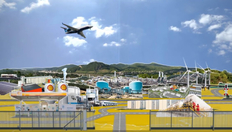- Crude oil processing at Wesseling will end by 2025.
- The new base oil plant will start operations in the second half of this decade.
- The plant will produce 300,000 tonnes of Group III base oils annually.
- This conversion will reduce carbon emissions by 620,000 tonnes per year.

Investment Decision
Shell Deutschland GmbH has decided to convert the hydrocracker at the Wesseling site within the Energy and Chemicals Park Rheinland into a production unit for Group III base oils, which are used in high-quality lubricants like engine and transmission oils. Crude oil processing at Wesseling will cease by 2025, but will continue at the Godorf site.
Carbon Emissions Reduction
The conversion is expected to significantly reduce Shell’s scope 1 and 2 carbon emissions by approximately 620,000 tonnes annually. This aligns with Shell’s target to become a net-zero emissions energy business by 2050. The high degree of electrification of the new base oil plant contributes to this reduction.
Production Capacity
The new base oil plant is scheduled to start operations in the latter half of this decade, with a production capacity of around 300,000 tonnes per year. This output will meet about 9% of the current EU demand and 40% of Germany’s demand for base oils.
Market and Technology
Group III base oils, produced using hydrocracking technology, have a very high viscosity index. The market for high-quality engine and transmission oils, as well as e-fluids and cooling fluids made from these base oils, is expected to grow. Shell has also invested in a 10-megawatt electrolyser for renewable hydrogen production and a biomethane liquefaction plant at the Energy and Chemicals Park Rheinland.

